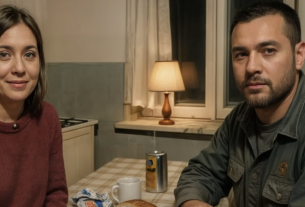In a small town where everyone was known at least by sight, the name Alexey sounded like a promise — a promise of life, a chance, salvation. His surname was synonymous with medical skill, a symbol of generations of doctors whose dedication to the profession knew no bounds. It was more than a tradition — it was a path laid out by decades of selfless work and hundreds, if not thousands, of saved lives.
His grandfather and grandmother — young military medics — met on the frontline, amid the thunder of gunfire and the moans of the wounded. Their hands, not yet touched by age, worked tirelessly: extracting shrapnel, stitching wounds, bringing soldiers back from the brink of death. Portraits of these people hung in Alexey’s home like family saints — stern, but full of love and dignity.
His parents, Egor and Marina, continued their parents’ work. They had avoided war, but their battlefield became the operating room. Their romance began under the cold light of the surgical ward lamps, among the smell of antiseptics and the monotone beeping of machines. What started as an office romance became a strong union of two hearts bound by the Hippocratic oath and mutual love.
Alexey grew up in an atmosphere of sacred duty. He was a quiet, thoughtful child with his father’s deep eyes. He studied excellently, winning biology and chemistry olympiads as if absorbing knowledge from nature itself. He never spoke openly about his plans, but for his parents, everything was clear. They did not demand or insist — they simply waited. Their expectation hung in the air, dense and silent.
After graduation, shy but determined, when he announced he had applied to medical school and wanted to become a surgeon, his father just nodded, and his mother couldn’t hold back tears of pride. The dynasty would continue.
Student years swept Alexey into a whirlpool of lectures, sleepless nights, and rare but loud parties. One May, at one such gathering, tired after exams, he leaned against the wall of the assembly hall, watching the dancers. And then he saw her.
Among many faces, she stood out like a flash of light. Golden hair, blue eyes as deep as the summer sky after rain. She stood slightly apart, talking to a friend, laughing so lightly and sincerely that Alexey’s heart stopped.
The girl’s name was called from the stage — Olga. She stepped out, took a guitar, and sang. Not perfectly, not loudly, but her voice carried such warmth, such living feeling, that he, a man of exact sciences, understood: this was love. From the very first note.
After the concert, overcoming his usual reserve, Alexey approached her, awkwardly praised the performance, and offered to walk her home. To his surprise, she agreed. They walked the night street, words flowing easily and freely. He spoke about family and his dream to become a doctor; she talked about music and the small apartment inherited from her grandmother. They were from different worlds — he from the world of scalpels and diagnoses, she from the world of poems and chords. But together it was easier than with anyone before.
On the third date, Alexey did something he did not even expect of himself. From his pocket, he took out a velvet box. Inside lay an antique gold bracelet — a family heirloom, once gifted to his grandmother by his grandfather. He gently placed it on her wrist.
“This is so you know my feelings are serious,” he whispered.
Olga blushed shyly, wanted to refuse — the gift was too expensive. But noticing the plea in his eyes, she just nodded and accepted the token.
Their wedding was modest — no pomp, no crowd of guests. Only the closest. They settled in Olga’s small apartment, filled with coziness and music. Alexey’s parents, initially wary of the girl “from another world,” softened when they saw how their son’s eyes shone beside her. Olga was accepted as family.
After university, Alexey chose the city hospital over prestigious private clinics. There, where his help was needed most. Olga began working with children — running a music club at the local center.
Their life flowed calmly, filled with simple joys: morning coffee, her quiet singing by the stove, long talks before sleep. She was his support, he was her protection. Everyone said: fate brought them together.
But in this harmony there was a crack — their home knew no children’s laughter. At first, they paid no mind, busy with work and love. Over time, the anxiety grew into pain. Doctors followed, tests, examinations. The verdicts were vague. They traveled to holy places, lit candles, consulted healers. A miracle did not happen. Their happiness was whole, but inside yawned emptiness.
Almost twenty years passed. Hope for their own child faded. One evening, sitting at the kitchen table, Olga said quietly but decisively:
“Lyosh… Maybe we should take a child from an orphanage? Give him a home.”
Alexey, seeing the last hope in her eyes, hugged her and agreed. A new faith awoke in their hearts.
A couple of weeks later, Olga went to the orphanage. She walked the corridors, looked into children’s faces, but nothing stirred her soul. Suddenly, from the assembly hall came a child’s voice. Thin, clear, a little scared. She peered inside. On the stage sat a little girl with big eyes and braids — and she sang.
This was Zoya.
Olga ran out, grabbed her phone.
“Lyosh, I found her! I found our daughter!” she cried into the phone, happier than ever.
She approached Zoya, carefully crouched before her.
“I’ll be back soon. I promise.”
And, obeying impulse, took off the old bracelet — the very first gift from Alexey — and put it on the thin wrist of the girl.
“So you wait for me.”
She rushed out of the orphanage, full of joy, forgetting everything. Jumped into a taxi. It was raining, the road was slippery. The inexperienced driver lost control, the car veered into the oncoming lane. A piercing scream, metal screeching, a crash — and then silence.
Alexey, who had held the lives of others in his hands all his life, now looked at the lifeless face of the woman he loved. Behind him, the calm, soulless voice of a colleague:
“Severe traumatic brain injury. Coma. No prognosis.”
A desperate battle for Olga’s life began. Alexey sold everything: their small but cozy apartment, the old car — even those things dear to him by memories. He went into debt, paying for the best specialists, buying rare medicines, spending his last strength on hope. He could not stop believing. He had to believe.
But Olga lay in an endless gray coma fog, as if her soul had long left her body. Life was sustained by machines, but she was no longer there. After several agonizing months, her heart stopped.
The light went out. Alexey’s world collapsed irretrievably. He was left alone, face to face with grief so immense it filled everything — to the last corner of his soul. He moved to a tiny rented apartment on the city outskirts. Colors disappeared, sounds hushed, meaning scattered. He no longer lived — he existed mechanically, like a shadow, moving between home and hospital.
At work, he became a stranger among his own. Withdrawn, unshaven, in a crumpled coat, he drew sympathetic looks from colleagues. They whispered behind his back, pitied him but did not dare approach. Soon a legend grew around him: a brilliant surgeon able to perform the most complex operations, then refuse money with a wave of his hand. Money, recognition, career — all turned to dust. The only thing left were his hands, which still worked flawlessly, saving others’ lives but unable to save his own.
Fifteen years passed.
An ordinary day, filled with routine and the smell of antiseptics. Nurse Katerina peeked into the doctors’ room:
“Alexey Egorovich, urgent to the operating room! A girl with acute appendicitis and beginning peritonitis has arrived.”
He nodded briefly, pulling on his mask as he went.
The operation was successful. His hands moved confidently, precisely, almost mechanically, doing the work they knew better than he did himself. The patient’s face did not interest him. For him, it was just another life torn from death.
The next day, during the morning rounds, he looked into her room. The girl, about twenty, pale but conscious, smiled faintly:
“Thank you, doctor.”
Alexey nodded and mechanically took her hand to check the pulse. Suddenly, he froze. His fingertips touched something cold and hard. He looked down — on the girl’s wrist was an old, faded gold bracelet with barely visible engraving. His bracelet. Olga’s bracelet.
The world swayed. Alexey recoiled as if struck by electricity. He couldn’t breathe. Waiting for the nurse to leave, he sat beside her, on the edge of the bed. His voice trembled:
“Where… where did you get this bracelet?”
The girl looked at him with surprise, tears filling her eyes:
“It’s the only thing I have. A woman gave it to me… I was in an orphanage. She came, said she would take me. She put this bracelet on my wrist and… disappeared. I waited for her for many years.”
Zoya. It was her. The very girl. The one who was meant to become their daughter. Alexey looked at her, and for the first time in many years tears rolled down his cheeks — not from grief, but from sudden revelation. This was Olga’s last wish, her farewell gift. Not a coincidence, not chance — a sign. She did not simply disappear. She passed him this thread, binding him to life. And he understood — he must fulfill her will.
From that day, Alexey’s life gained a new center. He began caring for Zoya — first awkwardly, timidly, then more confidently. He visited her every day, brought fruit, told her about himself, about work. After her discharge, he helped find housing, enroll in school. He became the father she never dared dream of.
Learning that Zoya loved to sing, he found her the best teacher. Supported her in everything. The girl entered music college. Sometimes in the evenings, she sang for him — songs from Olga’s repertoire. Alexey sat with closed eyes and wept — but now these were tears of gratitude and gentle sorrow.
Zoya gently and unobtrusively began to change his life. She dragged him to the store, threw out his old worn sweater, bought new clothes. Colleagues at the hospital were amazed: instead of a “weirdo,” they saw a fit, still not old man, with a lively expression in his eyes again.
Years passed. Zoya became a famous singer. Leaving for her first big tour, she insisted that Alexey move out of his modest shack into her spacious and bright apartment.
But the happiest day for Alexey was when Zoya, shining with joy, announced she was getting married and asked him to be her father at the altar.
Standing in the church, watching the young couple, he thought of Olga. Felt her presence, her smile, her voice nearby. It was she, his beloved, leaving, who gave him this farewell gift — meeting Zoya, the found daughter, a new hope. His life gained fullness again.
And a year later, when Zoya, leaning against him, whispered:
“Congratulations, Dad. You’re going to be a grandfather soon…”
Alexey understood: the circle had closed. His dynasty would live on.



